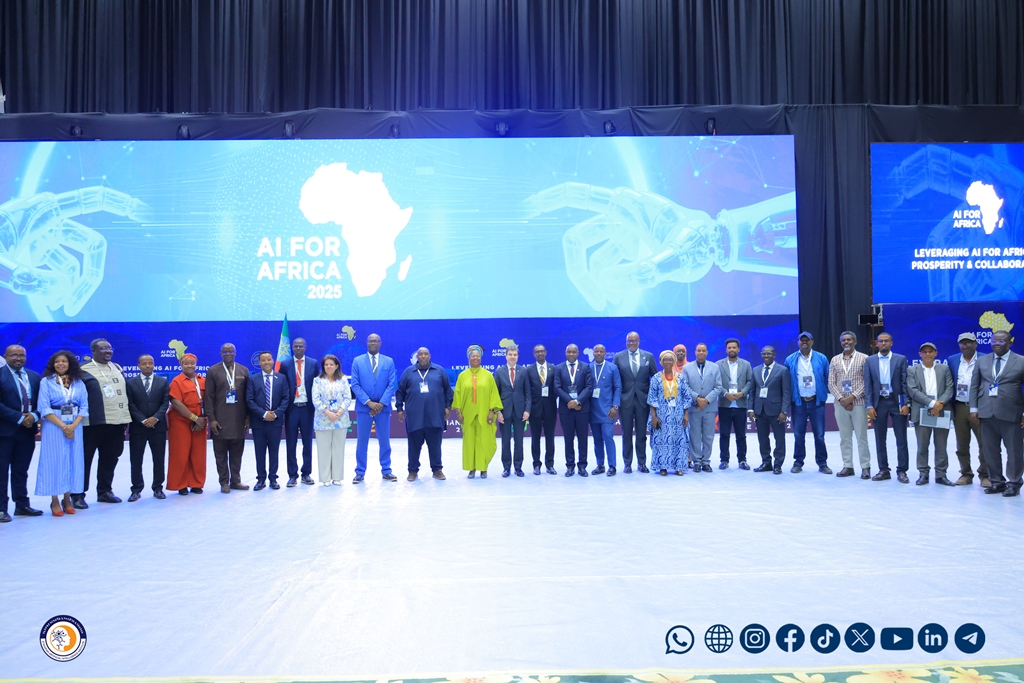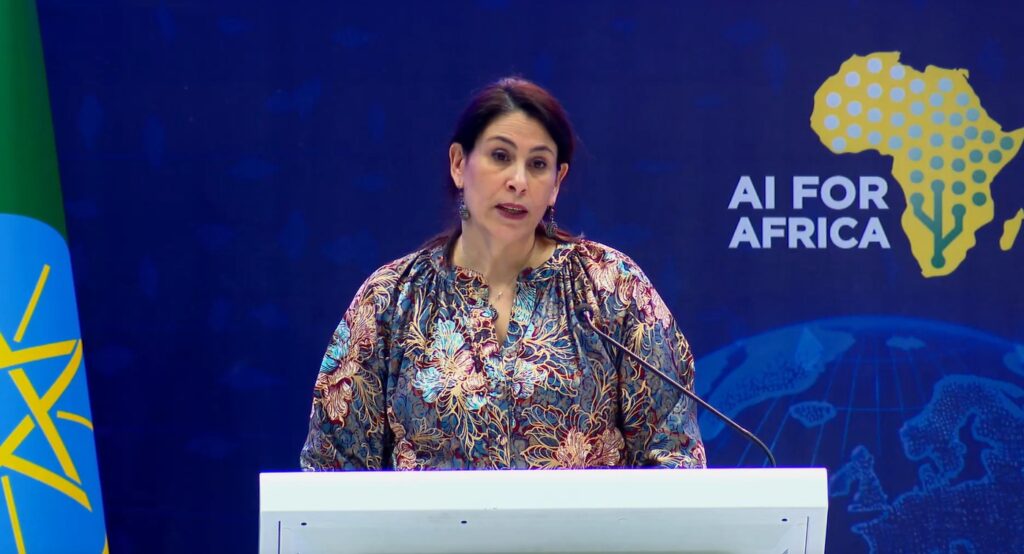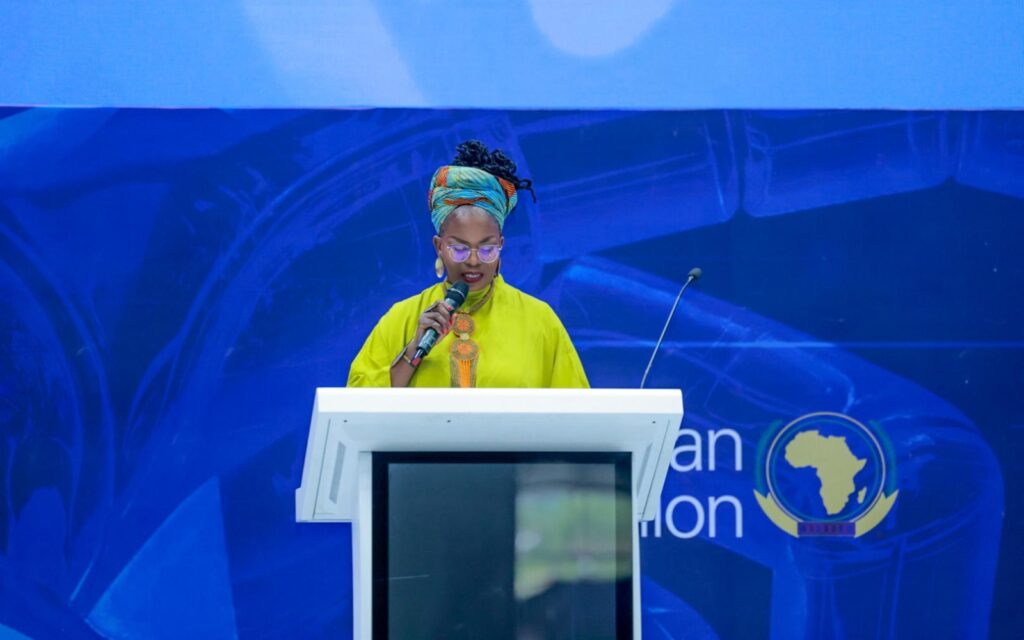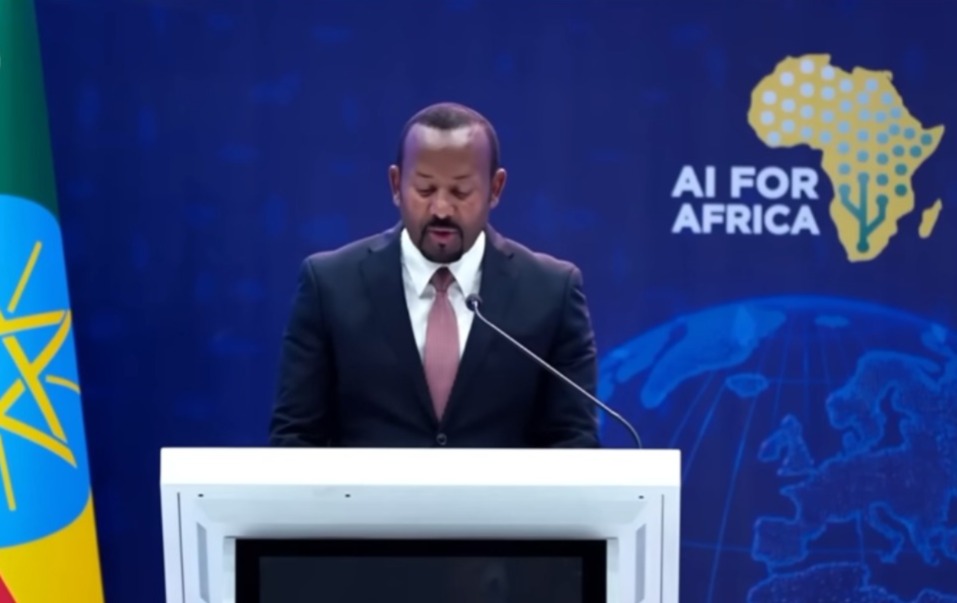
By Baboloki Semele: In a moment that may come to be regarded as a turning point in Africa’s digital renaissance, the African Union Commission convened a landmark High-Level Policy Dialogue on the Development and Regulation of Artificial Intelligence (AI)at the Addis International Convention Center (AICC) in Addis Ababa, Ethioipia. Held under the theme “Leveraging Artificial Intelligence for Africa’s Development, Prosperity and Collaboration,” the forum brought together over 40 African nations, Heads of State and Government, Ministers of ICT and Foreign Affairs, among them Ethiopian Foreign minister Gedion Timothewos, diplomats, leading academics, civil society leaders, and technology pioneers.The dialogue served as a launchpad for Africa’s bold entry into the AI era not as a consumer, but as a creator.

Her Excellency Selma Malika Haddadi, Deputy Chairperson of the African Union Commission, delivered an inspiring keynote that set the tone for the dialogue.
“AI has emerged as one of the most disruptive forces in geoeconomics and geopolitics,”
she said, noting the stark disparity between the market capitalization of global tech giants and the continent’s GDP.
“In January 2025, Apple’s market valuation was US$3.524 trillion comparable to Africa’s 2023 GDP of US$3.1 trillion,” she remarked.
This reality, she warned, underscores the urgency for Africa to develop and regulate its own AI ecosystems or risk deepening technological dependency. Her message was clear: Africa must shape its own digital destiny. With the AU Continental Strategy on Artificial Intelligence adopted in July 2024 as a guiding framework, Haddadi reaffirmed the continent’s commitment to achieving Agenda 2063, the AU’s blueprint for an integrated and prosperous Africa. AI, she emphasized, is not a luxury but a critical tool for transformation in sectors including education, health, agriculture, governance, and cultural preservation.

Delivering her remarks, H.E. Lerato Mataboge, AU Commissioner for Infrastructure and Energy, emphasized that AI is already making a measurable impact across the continent, with more than 2,400 AI-focused organizations working in areas like agritech, fintech, and education. Agritech platforms alone now reach over 33 million users, transforming Africa’s largest economic sector.
“AI is not a far-off dream—it is here, shaping lives and transforming communities across Africa,” Mataboge declared.
Still, she acknowledged the persistent challenges sch as limited digital infrastructure, Africa’s meager 1% share of global computing power, an AI talent pool representing only 3% of the global total, and a scarcity of high-quality datasets that reflect African contexts.
“We cannot afford to be passive consumers…. we must become architects of our own AI destiny.” she said
Mataboge laid out a comprehensive call to action centered around the AU’s Continental AI Strategy, urging nations to develop homegrown AI talent, mobilize African-led funding mechanisms, establish a network of regional computing facilities and data centers, craft legal and ethical AI frameworks grounded in African values. She stressed the importance of an AI ecosystem that speaks African languages, understands local cultures, and addresses uniquely African challenges. From data privacy and misinformation to gender equity and job displacement, Mataboge championed a people-first, inclusive, and ethical approach to AI development and governance. With only eight African nations having adopted national AI strategies, she urged swift action.
“Declare AI a national priority. Build national governance mechanisms. And most importantly, invest in education to produce the next generation of AI experts inspired to solve Africa’s own challenges.”
Her call was a rallying cry for pan-African cooperation, a vision where countries pool their human, financial, and technical resources to birth a unified, continent-wide AI movement.

Declaring the event officially open, H.E. Prime Minister Abiy Ahmed of the Federal Democratic Republic of Ethiopia delivered a stirring message of hope and ambition.
“AI is no longer a distant dreammit is the engine of transformation across sectors, geographies, and societies,”
the Prime Minister said, expressing strong optimism over AI’s potential to accelerate the goals of Agenda 2063. He emphasized Ethiopia’s commitment to becoming an active contributor rather than a passive consumer of AI technologies:
“We made a deliberate choice not to remain passive consumers of imported innovation, but to become active contributors, leveraging AI to address challenges grounded in our own realities.”
The conference culminated in the adoption of the Addis Ababa Statement, a landmark declaration that reaffirmed Africa’s determination to position AI as a driver of inclusive development, digital sovereignty, and transformative governance. Participants called for the formulation of an Action Plan and a comprehensive Africa AI Policy, the mainstreaming of AI across sectors such as health, education, agriculture, and public service, the establishment of a Continental AI Governance Mechanism, grounded in democratic values, African cultures, and the rule of law. Crucially, the statement emphasized that AI must be made in Africa, for Africa. The communique declared:
“Our goal is nothing less than to develop vibrant, inclusive, and sustainable AI ecosystems across Africa. We must enable our people to equitably access and fully benefit from AI-based opportunities, while ensuring that our values and voices shape this future.”
Recognizing that AI transcends national boundaries, delegates called for enhanced continental and global cooperation. Key proposals included; mobilizing financial and technical resources to close Africa’s digital divide, establishing strategic partnerships through AU diplomatic channels, amplifying Africa’s presence in international AI governance forums. The gathering also acknowledged the contributions of Ethiopia and the Institute for Security Studies, whose collaboration ensured the success of the first edition of this dialogue. As a result, it was resolved that the AI Policy Dialogue will be institutionalized and held annually, with the next edition scheduled alongside the AU Summit in 2026. The policy dialogue coincided with the Ethio Tech Expo 2025, a showcase of Ethiopia’s burgeoning tech sector. Innovations in AI, cybersecurity, smart city development, and digital infrastructure were displayed, reinforcing Ethiopia’s emerging role as a regional tech hub.